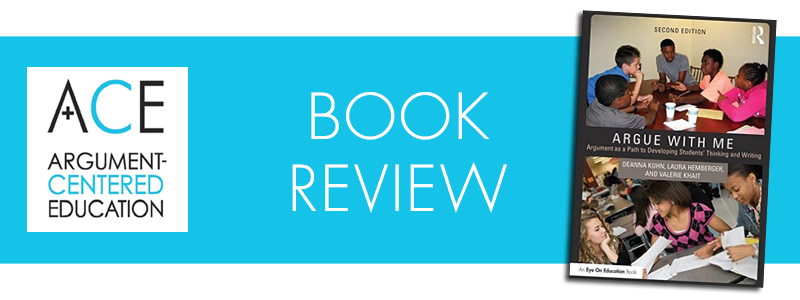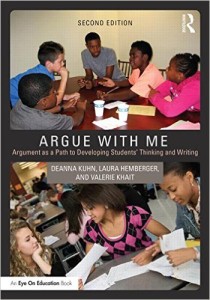Why Argument Writing Is Important in Middle School
By Leslie Skantz-Hodgson and Jamilla Jones
Is argumentative writing important for today’s middle school students to master?
This past summer we were among six educators who thought diving into the argument aspect of teaching academic writing was important enough to gather during the break and share thoughts on a close reading of They Say/I Say: The Moves that Matter in Academic Writing (W.W. Norton, 3rd edition, 2014) by Gerald Graff and Cathy Birkenstein.
In addition to learning together, we also argued and debated together (a lot) about the strategies and beliefs reinforced in the text.
Looking inward and outward
We were a mixed group of teachers of disciplines — science, English language arts, humanities, special education — across the grade levels. Our inquiry work was supported by a grant from the National Writing Project.
Our common goal was to learn how to impress upon our students the value and importance of developing their arguments “not just by looking inward but…by listening carefully to what others are saying and engaging with other views.” (Birkenstein/Graff, p. xxvi)
Book Review: ‘Argue with Me,’ 2nd Edition (Routledge, 2015), by Deanna Kuhn et al
Dr. Deanna Kuhn, professor of education and psychology at Columbia University, has been writing about and closely researching the use of argumentation strategies in K-12 education for 20 years. Professor Kuhn’s work has helped blaze a trail for the application of an argument-centered instructional approach throughout the K-12 curriculum. She has the force of a triple-threat: her books present the pedagogical theory for classroom instruction through argument, she (along with her co-authors on Argue with Me) have put together some of the basic building blocks of an argument-based curriculum, and she has conducted highly credible academic research demonstrating the undeniable performance gains that middle school students experience when required to build and make arguments throughout their literacy instruction.
So the new publication of a second edition of her most recent book is an event for professionals in the argument-education field, like us at The Debatifier. We are very pleased to report that Argue with Me: Argument as a Path to Developing Students’ Thinking and Writing (Routledge, 2015) doesn’t disappoint our keen anticipations.
Professor Kuhn begins this work with a reminder of argument’s significance as an intrinsic educational process.
Arguing in fact has been claimed by cognitive scientists to be not just central to human thinking and reasoning but its central objective. Oaksford et al characterize argument as the umbrella under which all reasoning lies: it is ‘the more general human process of which more specific forms of reasoning are a part.’ Possibly, then, the new standards [e.g., Common Core] are getting to the heart of the matter of thinking well.
Generative Blanks: Using ‘They Say/I Say’ Templates in a Writing Center
by Janel Atlas
Much of the current scholarship published in the Writing Center Journal, Praxis, and College Composition and Communication reveals that minimalist tutoring is still very much the dominant philosophy in writing centers. While I agree that writing center sessions should keep student writers in control of the focus and direction of appointments, I still maintain that offering rhetorical templates and formulas can empower writers rather than stifle them.
—
Those two sentences do not make for spell-binding prose, but they do indicate clearly the space I’m carving out to share my ideas. The formula I used is based on the ur-formula put forward by Gerald Graff and Cathy Birkenstein’s They Say/I Say: The Moves that Matter in Academic Writing, first published in 2006 and now in its 3rd edition (W.W. Norton, 2015). My opening two lines of this paper employ the ‘they say/I say’ construction Graff and Birkenstein encourage academic writers to use.





